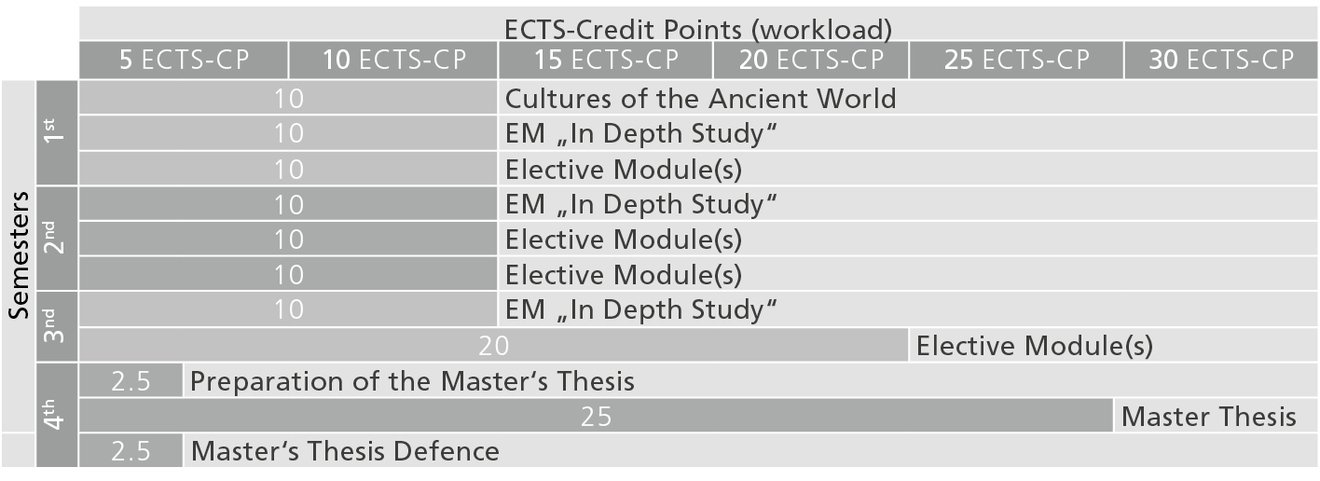Master's Programme Ancient Worlds
Curriculum (2022W)
Master of Arts (MA)
Duration / ECTS-Credits
4 semesters / 120 ECTS-Credits
Mode of Study
Full-Time
Language of Instruction
German
Admission Requirements
Relevant bachelor's degree or equivalent and Language Certificates
Faculties
Faculty of Philosophy and History
Faculty of Language, Literatur and Culture
Qualification Level
Master (Second Cycle)
ISCED-11: Level 7, EQF/NQF: Level 7
ISCED-F
0288 Arts and humanities, inter-disciplinary programmes
Study Code
UC 066 586
Information on the Curriculum (2022W)
The complete version of the curriculum reflects the currently valid version of the curriculum. It is for informational purposes only and is not legally binding. The legally binding version of the curriculum, including any amendments, may be found in the University of Innsbruck Bulletins.
In order to determine which version of the curriculum is applicable in your case, see the Catalogue of Studies
available at: https://lfuonline.uibk.ac.at/public/lfuonline_meinestudien.studienblatt
Section: Current Curriculum version.
- English version of the Curriculum
- University of Innsbruck Bulletin October 5, Issue 1, No. 1 - PDF (Recognition Regulation)
- University of Innsbruck Bulletin August 8 2022, Issue 69, No 715 - PDF (Recognition Regulation)
- University of Innsbruck Bulletin June 7 2022, Issue 49, No. 568 - PDF
Requirements
Relevant study programmes at the University of Innsbruck:
Proof of general university entrance qualification:
The general university entrance qualification for admission to a master's programme must be proven by the completion of a subject-related bachelor's programme, another subject-related programme of at least the same higher education level at a recognised domestic or foreign post-secondary educational institution, or a program defined in the curriculum of the master's programme. To compensate for significant differences in subject matter, supplementary examinations (maximum 30 ECTS credits) may be prescribed, which must be taken by the end of the second semester of the master's programme.
The rectorate may determine which of these supplementary examinations are prerequisites for taking examinations provided for in the curriculum of the master's programme.
In the course of the proof of the general university entrance qualification, the completion of the following core areas within the framework of the completed bachelor's degree programme shall be examined in any case:
- 40 ECTS-Credits from the core area of History or Archaeology or Classical Philology or Ancient Oriental Philology
- 20 ECTS-Credits from the core area Methods and Theories of Cultural Studies
Recommended Course Sequence
The exemplary course sequence given below is recommended for full-time students beginning their study programme in the winter semester. The table shows one possible course sequence for the bachelor's programme and is not compulsory. Delays resulting from repeated examinations are not taken into account.
The standard duration of the study programme is 4 semesters or 120 ECTS-Credits, whereby according to the Universities Act of 2002, a workload of 1,500 (real) hours per academic year must be fulfilled, corresponding to 60 ECTS-Credits (one ECTS-Credit is equivalent to a workload of 25 hours).
10.0 ECTS-Credits : Cultures of the Ancient World
10.0 ECTS-Credits : EM "In Depth Study"
10.0 ECTS-Credits : Elective Module(s)
10.0 ECTS-Credits : EM "In Depth Study"
10.0 ECTS-Credits : Elective Module(s)
10.0 ECTS-Credits : Elective Module(s)
10.0 ECTS-Credits : EM "In Depth Study"
20.0 ECTS-Credits : Elective Module(s)
2.5 ECTS-Credits : Preparation of the Master's Thesis
25.0 ECTS-Credits : Master Thesis
2.5 ECTS-Credits : Master's Thesis Defence

§ 7: An in-depth course of 30 ECTS-Credits must be completed:
- A. Ancient History: EM 1 - 3
- B. Ancient Oriental Philology: EM 4 - 6
- C. Greek Studies: EM 7 - 9
- D. Latin Studies: EM 10 - 12
- E. Classical Archaeology: EM 13
- F. Near Eastern Archaeology: EM 14 - 16
§ 8 Para 2 No 2 (EM 17 - 26): Of the 50 ECTS-Credits to be completed in the elective modules, 30 ECTS-Credits can be replaced by an Minor.
| Semester | ECTS-AP | Titel |
|---|---|---|
Minor
As part of the Master’s Programme, a Minor of 30 ECTS-Credits can be completed.
More information and a list of possible Minors can be found at:
https://www.uibk.ac.at/studium/angebot/wahlpakete/
Information about examination regulations, assessment and grading
Examination regulations
The examination regulation is an integral part of the curriculum, detailed information can be found under the paragraph examination regulations.
The grade distribution table is a statistical representation of the distribution of all successfully completed examinations in a given programme of study or subject (based on all registered students for the programme or subject). The grade distribution table is updated in regular intervals.
| A | B | C | D | E |
|---|---|---|---|---|
| Austrian grading scheme | Definition | %-age | ||
| 1 | EXCELLENT: Outstanding performance | = 100% | ||
| 2 | GOOD: Generally good, but with some errors | |||
| 3 | SATISFACTORY: Generally sound work with a number of substantial errors | |||
| 4 | SUFFICIENT: Performance meets the minimum criteria | |||
| 5 | INSUFFICIENT: Substantial improvement necessary; requirement of further work |
to be updated
Overall classification of the qualification
Not applicable
Explanation: An overall classification (mit Auszeichnung bestanden/pass with distinction, bestanden/pass, nicht bestanden/fail) – is awarded only for examinations that conclude a programme of study and consist of more than one subject (an examination of this type is not specified in the curriculum of this programme of study).
Forms (in German only)
- Examination Records
- Assessment of the compulsory module: Preparation of the Master’s Thesis
- Cover Sheet for the Master's Thesis
- Recognition of examsANDSupplementary Sheet
- Application for Admission to the third and fourth repetition of a course examination
Forms and Guideline for submitting the Master's Thesis (valid since 01.11.2023)
Contact and Information
Examination Office
Location Innrain 52d
Associate Dean of Studies
Priv.-Doz. Mag. Mag. Dr. Sebastian Christoph Fink
Dean of Studies
Faculty of Philosophy and History
Assoz. Prof. Mag. Dr. Brigitte Truschnegg
Dean of Studies
Faculty of Language, Literatur and Culture
Ass.-Prof. Mag. Dr. Gerhard Pisek
